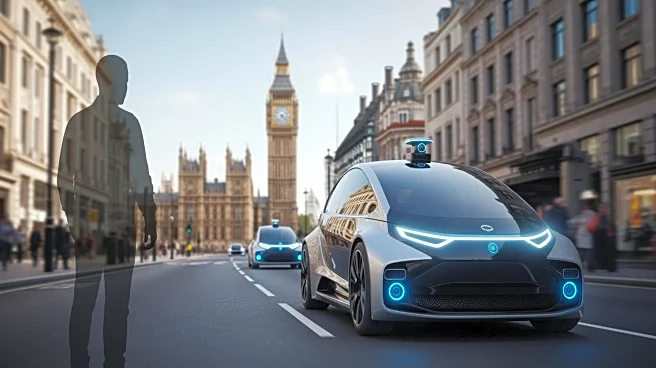What's Happening?
Waymo, Alphabet's autonomous ride-hailing service, is set to launch its first European fleet in London, starting with a small number of human-supervised vehicles. The company plans to transition to fully
autonomous operations by 2026. Waymo's rollout in London will feature all-electric Jaguar models, supported by fleet operations partner Moove. The initiative aims to align with London's transport priorities, focusing on reducing road injuries and expanding mobility options. Waymo has demonstrated its ability to scale autonomous ride-hailing responsibly, citing over 100 million autonomous miles driven in the U.S. with fewer collisions than human drivers. Despite promising safety statistics, autonomous vehicles are not risk-free, as evidenced by over 460 reported incidents in the U.S., including minor injuries and at least one fatality.
Why It's Important?
The introduction of Waymo's autonomous vehicles in London represents a significant step in the evolution of urban transportation. This move could potentially reduce road injuries and expand mobility options, particularly for individuals who are blind or partially sighted, offering them a level of independence previously unavailable. Economically, the autonomous vehicle sector is projected to create 38,000 jobs in the UK by 2035, contributing to growth in fleet operations, depot management, and vehicle maintenance. However, public confidence remains a challenge, with a survey indicating that 38% of Londoners are uneasy about riding in driverless vehicles due to safety concerns. Ethical debates also persist regarding the behavior of self-driving AI in accident scenarios.
What's Next?
Waymo's phased rollout in London will begin with human-supervised vehicles, gradually expanding as regulatory approvals are obtained. The UK government is preparing a legal framework for fully autonomous vehicles by 2026, setting the stage for broader adoption. Waymo aims to complement London's goals for reducing road fatalities and serious injuries, leveraging its technology to operate safely in urban environments. The company will need to address public concerns and demonstrate the reliability and safety of its autonomous vehicles to gain widespread acceptance.
Beyond the Headlines
Waymo's entry into the London market is not only a technological advancement but also a strategic expansion into a challenging urban environment. London's narrow streets and congested traffic will test the capabilities of Waymo's autonomous systems. The success of this initiative could pave the way for similar expansions in other European cities, potentially transforming urban mobility. However, the economic viability of robotaxi fares and public confidence in autonomous technology remain uncertain, posing challenges to widespread adoption.












